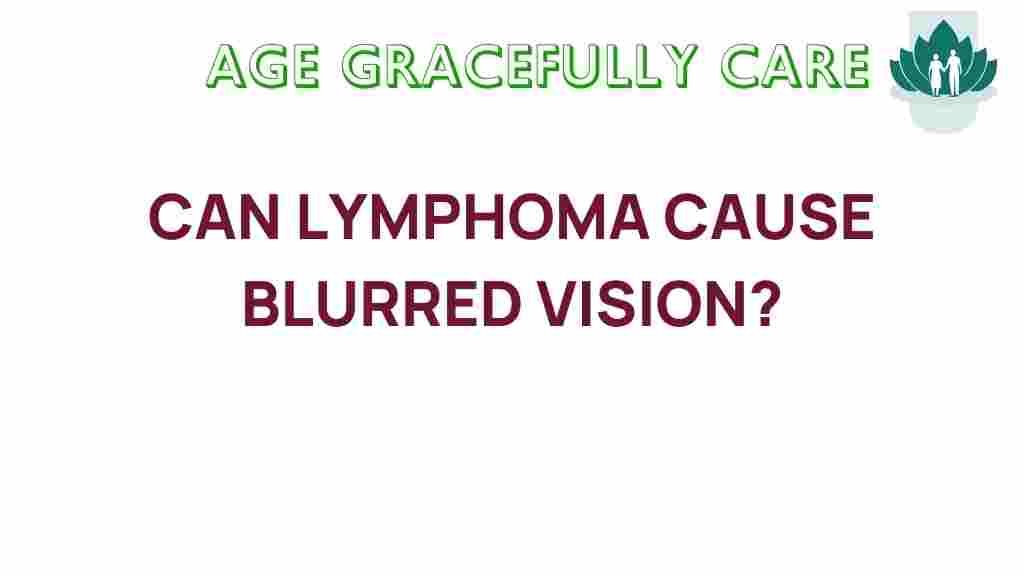Unraveling the Mystery: Can Lymphoma Cause Blurred Vision?
Lymphoma is a type of cancer that originates in the lymphatic system, which is a vital part of the immune system. With various forms of lymphoma, including Hodgkin and non-Hodgkin lymphoma, understanding the symptoms and their potential impacts on overall health is crucial. One lesser-known symptom that can be associated with lymphoma is blurred vision. This article aims to unravel the mystery surrounding the connection between lymphoma and blurred vision, exploring the symptoms, diagnosis, treatment, and overall patient awareness regarding eye health.
Understanding Lymphoma
Lymphoma primarily affects the lymphocytes, a type of white blood cell that plays a significant role in the immune response. When these cells grow abnormally, it can lead to tumors in the lymph nodes or other organs. There are two main types of lymphoma:
- Hodgkin lymphoma: Characterized by the presence of Reed-Sternberg cells.
- Non-Hodgkin lymphoma: A diverse group of blood cancers that do not have these cells.
Symptoms of lymphoma often include swollen lymph nodes, fever, night sweats, unexplained weight loss, and fatigue. However, the question arises: can lymphoma also lead to blurred vision?
Can Lymphoma Cause Blurred Vision?
Blurred vision is not a common symptom of lymphoma, but it can occur in certain cases. Here’s how lymphoma might impact eye health:
- Direct Involvement: Lymphoma can sometimes invade the eye or the surrounding tissues, leading to blurred vision.
- Secondary Effects: Complications from lymphoma treatments, such as chemotherapy or radiation, may also contribute to visual disturbances.
- Associated Conditions: Conditions related to lymphoma, such as infections or autoimmune responses, may also lead to blurred vision.
Symptoms of Lymphoma-Related Eye Issues
If you are experiencing blurred vision alongside other lymphoma symptoms, it’s essential to be aware of the following potential indicators of eye health issues:
- Sudden changes in vision
- Difficulty focusing
- Visual disturbances like floaters or flashes of light
- Eye pain or discomfort
- Redness or swelling around the eyes
Recognizing these symptoms can help in seeking timely medical intervention, which is crucial for overall health and effective treatment.
Diagnosis of Lymphoma and Eye Health Issues
Diagnosing lymphoma typically involves several steps, including:
- Physical Examination: A doctor will check for swollen lymph nodes or other physical signs of lymphoma.
- Imaging Tests: CT scans, PET scans, and MRIs can help visualize the extent of the disease.
- Biopsy: A definitive diagnosis often requires a biopsy of lymphatic tissue to examine the cells under a microscope.
- Ophthalmology Consult: If blurred vision is present, an eye specialist may conduct a thorough eye examination to assess any ocular involvement.
Early diagnosis is vital, as it can significantly impact treatment outcomes and overall patient health.
Treatment Options for Lymphoma
The treatment for lymphoma varies based on the type, stage, and specific characteristics of the disease. Common treatment modalities include:
- Chemotherapy: Uses drugs to kill cancerous cells, which can sometimes affect eye health.
- Radiation Therapy: Targeted radiation can be effective for localized lymphoma but may have side effects affecting vision.
- Immunotherapy: Aims to boost the body’s immune response against cancer cells.
- Stem Cell Transplant: In some cases, this procedure can be used to restore healthy bone marrow.
Discussing potential side effects, including those related to eye health, with healthcare providers is essential for informed decision-making.
Patient Awareness and Eye Health
Maintaining good eye health is crucial for lymphoma patients. Here are some tips to promote awareness and care for your eyes during treatment:
- Regular Eye Exams: Schedule routine check-ups with an eye specialist to monitor any changes in vision.
- Report Symptoms Promptly: If you experience any changes in vision, consult your healthcare provider immediately.
- Stay Informed: Understand the potential side effects of your lymphoma treatment and discuss them with your doctor.
- Protect Your Eyes: Use sunglasses to shield your eyes from UV rays and reduce glare.
- Manage Overall Health: A healthy diet, hydration, and proper rest can contribute to better eye health.
Being proactive about eye health can enhance the quality of life for lymphoma patients and provide peace of mind.
Troubleshooting Tips for Blurred Vision
If you or someone you know is experiencing blurred vision, consider these troubleshooting tips:
- Keep a Symptom Diary: Track when the blurred vision occurs and any accompanying symptoms. This information can help your doctor make a diagnosis.
- Avoid Strain: Reduce screen time and take breaks to prevent eye strain, especially if you’re undergoing treatment.
- Stay Hydrated: Drink plenty of water to maintain hydration, which is beneficial for overall health.
- Consult Professionals: Don’t hesitate to reach out to both oncologists and ophthalmologists regarding any visual disturbances.
Taking these steps can help manage symptoms and ensure that any serious issues are addressed promptly.
Conclusion
While blurred vision is not a typical symptom of lymphoma, it can occur due to various factors related to the disease and its treatment. Understanding the potential connections between lymphoma and eye health is essential for patients and caregivers alike. By being aware of symptoms, seeking timely diagnosis, and maintaining regular eye care, patients can better navigate their journey through lymphoma treatment.
Your health is paramount. If you suspect any vision changes or experience other symptoms, consult healthcare professionals without delay. For more information on lymphoma and patient support, you can visit Cancer.org or seek local resources.
For further reading on lymphoma and health management, check out our article on understanding cancer treatments.
This article is in the category Health and created by AgeGracefullyCare Team
